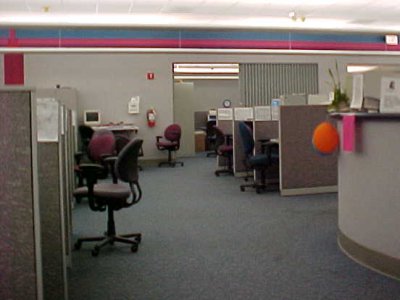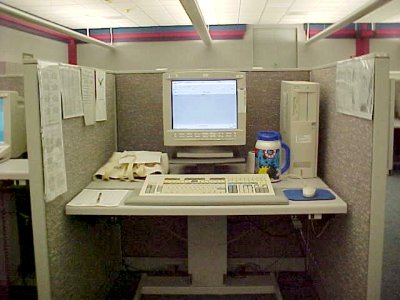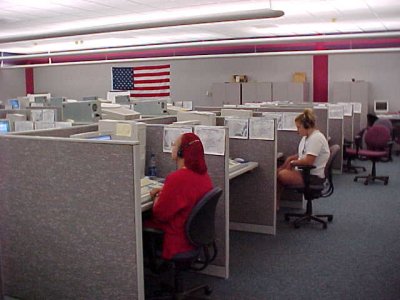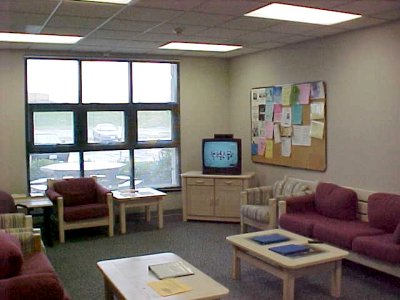A few career anniversaries in the next month…
7 minute read
March 23, 2017, 2:04 AM
The next month contains no less than three career anniversaries of mine. March 31 marks ten years since I was fired from Walmart, April 15 marks the 15th anniversary of when CFW Information Services (then Telegate USA) closed and I was laid off, and then April 18 marks ten years from the day that I was hired at Food & Water Watch. Rememberances of jobs past, I suppose.
The anniversary that still gets me is the CFW one. I can’t believe that it’s been fifteen years. That was my first job, which I started at age 16, in June 1997. It was a call center job, processing inbound calls for customers seeking directory assistance services in Virginia, West Virginia, Maryland, DC, Delaware, and New Jersey. Then Pennsylvania got added to the mix. Then we started doing two national services – one used by bill collectors doing skiptracing, and a wholesale service for the public through a variety of different providers. When the national services came online, I mostly did the bill collector service. That was a good job. The dress code was casual (after all, who saw you?) and you worked at a computer all day.
That job did, however, have a turning point. In June 2000, parent company CFW Communications made a major change to its corporate structure, merging with another regional telecommunications company in Virginia to form nTelos. As part of that same deal, Information Services was out. Our division would not become part of the new nTelos, as we were sold to Telegate, a company based in Munich, Germany. I remember watching this company, which had thrived under CFW ownership, be slowly destroyed under Telegate ownership. If I recall, Telegate acquired our company with the intention of gaining a foothold in the US marketplace, with the desire to eventually launch a “11880” style service in the US like they did in Germany. The “11880” style service never happened, and things basically stayed the same. Meanwhile, for a company with three Virginia call centers (Clifton Forge, Waynesboro, and Winchester), their choice of a headquarters location was surprising: Plano, Texas. Yeah, that makes a lot of sense. The management in Texas also seemed to come and go on a fairly regular basis, as one after the other either abruptly quit or was dismissed. It was no surprise when Telegate started closing call centers as the business started to drop off (probably due to the hideous management of the company), as Clifton Forge, Waynesboro, and Winchester all closed within about 6-7 months of each other. I was away at college at the time that my center closed, and never received any official notification from Telegate of the center’s closing, but rather, was notified by some of my soon-to-be-former coworkers. It just so happened that I would be in town the weekend before the closing, and so I stopped by to pick up my belongings and turn in my equipment. And that was the end of my first job.
I imagine that if CFW/Telegate had not closed, my job at Walmart would have never happened. Holding college constant, i.e. I still had the internship, went the extra semester, and didn’t have a “real” job upon graduation, I probably would have gone back to work in the directory assistance world until I found that job. After all, I loved it at CFW. Good working environment, good people, and good management.
The only thing that I didn’t like was the way that they tied call time to pay. We were paid hourly, base rate plus incentive, i.e. the lower our average call time was, the more we made per hour. That put two things at odds with each other: good customer service and pay. So if someone had a more difficult inquiry, that was costing me, personally, money. If you ever wondered why directory assistance so often gave wrong numbers, this was probably why, because at least in our case, pay was tied to call time, and thus the sooner we got rid of you, the caller, the more money we made. You want good service, don’t tie my pay to the speed at which I get rid of callers. Thankfully, when they introduced the national service, they moved away from that incentive-based pay structure that so bothered me, and instead paid straight time at a higher hourly rate than under the old incentive-based system.
Then the office was probably the most nineties thing ever:

The operations floor. Gotta love those color choices.

My workstation. We ran a software called “InquiryDesk” using a database by a company called LSSi.
I suppose it tells you something about how much I liked this job that I had dreams about it years after the center closed. One dream was a weird one, but more than one was pure nostalgia, as I was back at that facility once again, doing that job again. In these dreams, the center always looked exactly as I remembered it. Those were always happy dreams. In real life, however, our call center is now the operations center for a local credit union, and I’m told that the main operations room was subdivided into smaller spaces. Though I did find a recent photo in the hallway on Facebook. I posted an old photo of mine of the same space in the comments.
Then there was Walmart. I will have been out of their employment for ten years at the end of this month. They were a real piece of work. I lasted there exactly three years, four months, and 20 days. I consider it miraculous that I lasted that long, because that was by far the worst place that I ever worked. I was amazed about the extent that employees tattled on each other to management for things that were downright stupid. And this was on top of the dumb things that management would write you up for on their own, without external assistance. I always considered employees’ ratting out other employees to be extremely bad for morale, because then you can’t trust your teammates, if you think that they’re going to run to management to tell on you for any stupid little thing. Something like this happened to me in 2004, where an employee ratted me out for something extremely minor. In this case, it was over employee parking. In my particular store, employee parking was at the far end of the lot, beyond a certain point. Pretty sure that I was parked on the edge of the lot, flush with whatever landmark they used to determine the employee area. Coworker saw me and ratted on me to management for allegedly parking outside the employee area, and – get this – they actually gave me a writeup for insubordination over it. I was like, really? They took the coworker entirely at their word for it (and they were definitely out of place), and wrote me up for it.
But that’s not part of what led to my getting fired, interestingly enough. The official record is that I was fired for yelling at customers and coworkers alike, i.e. being extremely rude to just about everyone. Anyone who has spent any amount of time around me knows that’s not how I operate, and that I tend to be a pretty nice guy. There was no doubt in my mind that they were trying to get rid of me, because for the last six months of my tenure there, they were throwing everything at the wall in regards to me to see what stuck. I laughed in their faces for most of it, because their accusations were downright ridiculous. The best one was when they accused me of calling a coworker a “dickhead” in the breakroom, during a time when I was out of the building. There, they claimed that they had witnesses for it that they couldn’t produce, i.e. they didn’t have any (because I wasn’t even there), and they couldn’t even keep a straight face while accusing me of this behavior. But that didn’t stop them from writing me up for it. Oh, well. I told a current coworker last week about what I got fired for at Walmart, and they were surprised, nearly ten years later.
It always amuses me what lengths a company will go to in order to make the involuntary departure of an employee very personal. If the employer wants to fire someone in a non-union environment, that’s their prerogative. Employment at will means that an employee can quit at any time for any or no reason, and an employer can, subject to a few exceptions, fire someone for any or no reason. So if Walmart wanted to get rid of me, they should have just been upfront about it and let me go rather than wasting everyone’s time going through a whole disciplinary process, and then not challenge an unemployment claim. Oh, well.
That, of course, dovetails quite nicely with anniversary #3, which was when I got hired on at Food & Water Watch. Of course, they were no better than Walmart in many ways, but my getting hired there so quickly after getting canned at Walmart (18 days from fired to hired) did mean something else: I no longer had a firing on my “permanent record” as far as my work history went. With only six weeks between jobs, as well as a move to the DC area between the two, the question of, “Why did you leave Walmart?” got a better answer that benefits me more, i.e. I left because I got a better job than stupid Walmart.
Meanwhile, I’m happy in my current career in public transportation. I work for an organization where people generally stay until they retire, I’m a union member, and as far as career progression goes, I want to do everything before I retire, from operation to supervision to training to central control. I consider that a big part of knowing when you’re in the right field, when you really could see yourself doing a multitude of different jobs within the field, and see a career progression.











